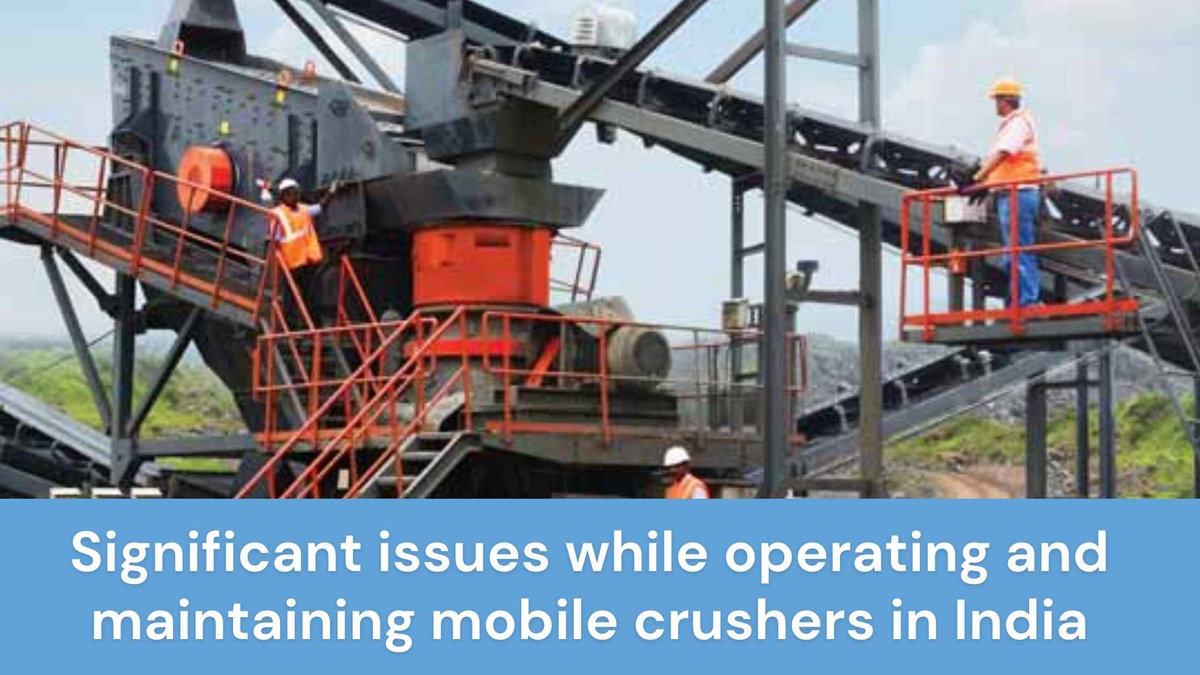The production of crushed stone in various sizes according to demand, which is used as the raw material for various construction activities such as the building of roads, highways, bridges, buildings, canals, etc., is a significant industrial sector in the nation. Over 12,000 mobile stone crusher facilities are thought to exist in India. The number is anticipated to increase further in light of the plans to construct the buildings, roads, and canals necessary for the nation's overall development. Over 500,000 people are thought to be directly employed in the sector, which includes workers engaged in mining, operating crushing plants, and transporting extracted stone and crushed goods, among other tasks. Since most of these employees come from rural, economically underdeveloped areas with few work opportunities, their contributions are of greater societal relevance in rural communities. It allows impoverished, uneducated, and unskilled rural residents to make money.
In this blog, we will learn about the issues while operating and maintaining mobile stone crushers in India. So, let's get started!
Issues while operating and maintaining mobile stone crushers
The surface mining, crushing, screening, material handling, and transfer processes used in quarries and stone processing are all possible sources of particle emissions. These sources can be classified as either fugitive dust sources or process sources. Process sources are those that can produce emissions that can be captured and then controlled. The re-entrainment of settled dust by wind or mechanical motion is a common component of fugitive dust sources. The kind, quantity, and moisture content of the processed rock, the type of equipment and operating procedures used, and topographical and meteorological conditions, all affect emissions from either source category.
- During Transportation - Due to the movement of large vehicles on earthen roadways, fugitive dust emissions happen when mined stones are transported by heavy vehicles like trailers, trucks, and dumpers. The amount of emissions is influenced by several factors, including weather, soil moisture, vehicle speed, frequency of use, etc. In general, such emissions can be greatly reduced by intermittently spraying water on these roads.
- During Crushing Operations - Particulate emissions are naturally produced during crushing operations, and they are most noticeable at the feed and outflow sites of the crusher. The emissions increase with the amount of size reduction throughout consecutive crushing stages, such as primary, secondary, and tertiary crushing. Cone or roller-type crushers produce more fines for following reduction stages due to attrition, increasing dust production.
- During screening- The mixture of stones is sized-separated and categorised in the screening section. The screening efficiency is typically estimated to be between 60 and 75%. Grizzlies, shaking screens, vibrating screens, and rotating screens are among the screening tools that are frequently utilised. Although wet or dry screening can be done, dry screening is more typical. The movement of dry-stone during screening processes causes dust to be released. Compared to a screening of coarse sizes, screening of fines results in increased emissions. Additionally, screens that are agitated at high frequencies and large amplitudes produce more dust than those that are disturbed at low frequencies and small amplitudes.
Maintenance of Mobile Stone Crushers
An underfunded maintenance program will ultimately cost operations a lot of money. Maintenance is frequently one of the items that get reduced. Reactive, preventative, and predictive maintenance strategies are available. Reactive means fixing a problem after it has occurred. Although frequently considered unneeded, preventative maintenance reduces downtime because the machine is fixed before it breaks. Predictive implies taking the necessary actions to fix the issue before failure happens by using previous service life data to identify when a machine is likely to break down.
Key wear components of the crusher, such as the rotor and liners, and benchmark items, like coast down times and amperage draw, are monitored during daily visual inspections of HSI crushers.
Researchers assert that there are far more instances of the absence of daily inspections than individuals would care to acknowledge. "By spotting potential issues now, you can stop failures from happening in the future. Get into the crushing chamber daily and inspect for blockage, material build-up, and wear. You might need to go in there more than once a day if you are working with particularly wet, sticky, or clay material. Visual examinations are essential. If the conveyor below a cone crusher breaks down, debris will accumulate inside the crushing chamber and eventually cause the crusher to break down. Unseen material can remain lodged inside.
Use only the fluids recommended by the manufacturer, and consult their instructions if you intend to use anything other. When adjusting oil viscosities, exercise caution. According to researchers, doing so will alter the oil's extreme pressure (EP) rating and could result in inconsistent performance in your machine. Additionally, bulk oils are frequently not as pure as you might believe, and it suggests having your oil tested. Each transition or servicing point should take into account pre-filtration. Contaminants like dirt and water can enter fuel during storage or when filling the engine. The days of the open bucket are over, claims Schmidt. Now, a lot of fluids need to be maintained clean.
Wrapping Up
By keeping an eye on these and other potential machine health indicators, you can spot issues earlier, before the machinery breaks down in the middle of a production run, and you can plan to service for a time when it won't cause you too much downtime. When performing predictive maintenance, benchmarking is essential.
A pound of treatment is worth an ounce of prevention. Repairs and maintenance can be expensive, but they are still preferable to the problems that could occur if neglected. There are several crusher manufacturers in India and if you are looking for some, reach out to ETrack, your one-stop solution for all needs.


No comments yet